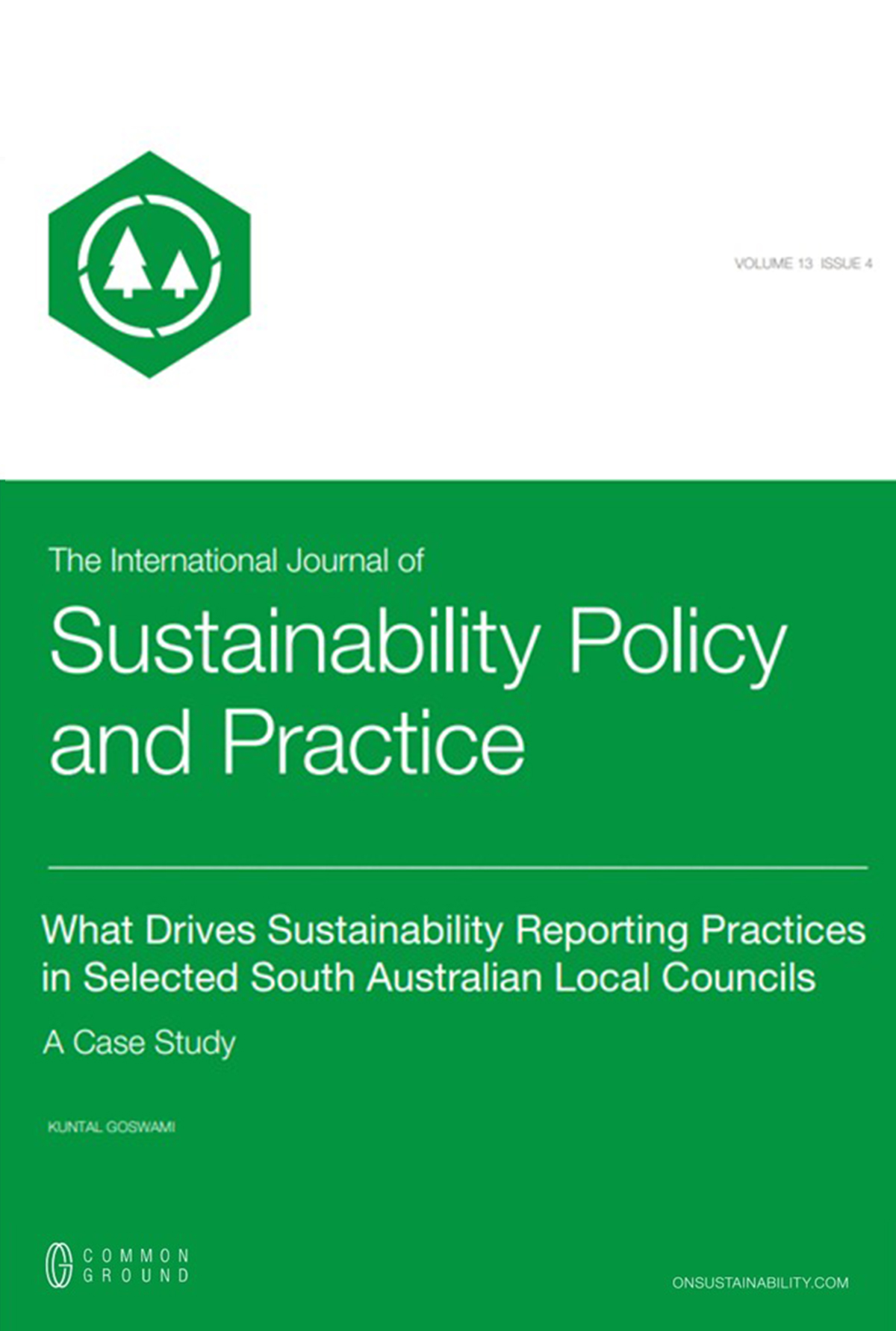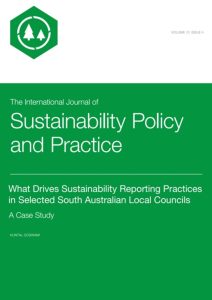Journal Articles
What Drives Sustainability Reporting Practices in Selected South Australian Local Councils A Case Study
What Drives Sustainability Reporting Practices in Selected South Australian Local Councils: A Case Study
Author: Kuntal Goswami, Charles Darwin University, Australia
Abstract: This article aims to understand what drives the selected South Australian local councils to undertake sustainability reporting without a mandatory reporting framework. The case study uses new institutional theory as the theoretical framework. The study focuses on four selected South Australian local councils and uses semi-structured interviews to explore influences on sustainability reporting practices in these councils.
The findings highlight several institutional factors that influence the sustainability reporting practices within these four councils. South Australia’s Strategic Plan, which acts as a quasi-coercive isomorphic pressure (semi-statutory obligation to abide by certain prescribed rules and regulations), is the most influential factor that motivates most councils to adopt sustainability reporting practices. In addition, evidence of normative isomorphism (information sharing among professionals) and mimetic isomorphism (following practices of other similar organizations) are identified in the study.
Overall, this research extends the institutional theory’s applicability in the sustainability reporting field and provides new perspectives to the limited literature on sustainability reporting in local councils.
Keywords: Sustainability Reporting, Local Government, Institutional theory, Isomorphism, South Australia
Citation: Goswami, K (2018), ‘What Drives Sustainability Reporting Practices in Selected South Australian Local Councils: A Case Study’ The International Journal of Sustainability Policy and Practice, Vol.13. No.4, pp.1-14. https://acsdri.com/publications-on-sustainable-development/what-drives-sustainability-reporting-practices-a-case-study/ and https://doi.org/10.18848/2325-1166/CGP/v13i04/1-14
Introduction Sustainability Reporting Practices
Traditionally, research on sustainability reporting has been business-focused, as companies controlled a substantial part of global economic activities, natural resources, and technologies (Gray and Bebbington 2001); however, this view is changing. The topic of sustainability has notably entered into the public policy domain, although sustainability reporting practice in the public sector is still in its early stages compared to the practices in the private sector (Dickinson et al. 2005; Herbohn and Griffiths 2008). Researchers in sustainability reporting have suggested that democratically elected bodies must embrace holistic sustainability disclosure practices (Ball 2002). This study focused on the motivations for South Australian local councils to undertake sustainability reporting without a mandatory reporting framework.
The study contributes to the sustainability research agenda in the public sector by exploring the influences on sustainability reporting practices in selected South Australian local councils. While existing corporate sustainability accounting research focuses on legitimacy theory as an explanation for social and environmental disclosure (Deegan 2002), this article argues that in addition to the existing theoretical perspectives, further investigation into this topic needs to be done from an institutional theoretical angle. Hence, this article adopts an institutional framework to understand the various motivations for sustainability reporting by South Australian local councils.
Sustainability Reporting Practices in Australian Local Governments
The local-government-specific research by Herbohn and Griffiths (2008) revealed that there are strong motivations to commence sustainability reporting at the council level and, in some cases, several local government managers had shown a personal interest in adopting change. However, it is not sure to what extent such systemic change is required at the council level. The sustainability outlook is not strongly integrated within the council’s decision-making processes (such as project assessment or managerial appraisal) (Herbohn and Griffiths, 2008).
A study by Sciulli (2011) highlighted that in addition to external influences such as population growth and new urban growth in lower infrastructure areas, there are internal influences from chief executive officers and elected councilors to report on sustainability issues. In addition, these senior figures also motivate staff members to address sustainability issues seriously. A separate study on six coastal councils highlighted that, in general, disclosure levels are low. The primary reasons for this are that council staff lack the training and resources to implement the Global Reporting Initiative’s (GRI) framework, and most importantly, there is a lack of statutory obligation to adhere to the GRI’s reporting format (Sciulli 2011).
Williams’ (2011) research also reflected a similar view, which showed that the GRI’s reporting framework has limited application at the local government level. The main reasons for this barrier are the lack of trained staff and resources and, most importantly, the lack of knowledge about the GRI guidelines. In this regard, Ball and Bebbington (2008) have argued that although the public sector reports sustainability issues in some instances, there is a greater need for a standard sustainability reporting format for comparability. Hence, the process of change requires further political support from both the federal and the state levels, without which the process of change will be slow and evolutionary (Herbohn and Griffiths 2008).
In general, the literature on local governments has highlighted the following:
(a) local governments are a state’s responsibility, and in different states, local governments are governed by different state-level legislation;
(b) the local-government-related sustainability reporting research is at the nascent stage;
(c) there is a lack of relevant data specific to local government in a particular state and
(d) research is too academic and lacks applicability at the council level (Burton 2011; Pritchard 2011).
Furthermore, the literature has also underlined that in some cases, councils within the same state or territory take different reporting approaches and disclose considerably different information (Macintosh and Wilkinson 2012). A separate study also revealed limited local government-specific sustainability reporting research (Williams,Wilmshurst, and Clift, 2009). While existing studies provided an understanding of the factors that influence sustainability reporting in the public sector, there needs to be more theorization of these influences. Therefore, there is a scope for further research to understand the motivating factors from the institutional perspective. In that respect, this study has advanced the public-sector-based sustainability-reporting literature by studying the four selected South Australian local councils through the institutional theoretical lens.
Local Governments in South Australia
In South Australia, there are sixty-eight local councils. These councils are one of the major sources of employment and investment within South Australia and are key providers of public goods and services. An estimate reveals that South Australian Local Governments manage about$10 a billion worth of infrastructure, provide over $1 billion worth of services each year, generate more than 8,000 direct local jobs, and play a major role in local planning and economic development (Local Government Association of South Australia 2012).
In South Australia, all councils are governed by the Local Government Act 1999, and pursuant to Section 7(e), each council must manage its business sustainably and conserve the local environment (Government of South Australia 1999). Under Section 8(f) of the Act, councils are required to contribute to sustainable development and the protection of the environment and to ensure a proper balance among economic, social, and environmental factors within the community (Government of South Australia 1999). However, there is still no mandatory requirement to publish sustainability reports. This research is undertaken in this context to demonstrate the motivations for adopting sustainability reporting practices by selected South Australian local councils in the absence of any mandatory reporting guidelines.
Institutional Theory
Institutional theory has often been applied in research to explain institutional behavior. For instance, studies by Baker and Rennie (2006) and Carpenter and Feroz (2001) use institutional theory to explain what motivates organizations to adopt particular accounting practices. Larrinaga-González (2007) and Lodhia, Jacobs, and Park (2012) posit that a more comprehensive understanding of the motivations to adopt sustainability reporting practices can be developed by using institutional theory rather than legitimacy theory. Bebbington, Higgins, and Frame (2009)illustrated how institutional pressures motivate organizations to pursue sustainability reporting practices in order to “fit in” with similar organizations. Similarly, Joseph and Taplin (2012)highlight how Malaysian local authorities adopted sustainability reporting practices after following the web-based disclosure practices of other councils. Applying institutional theory for this study extends the previous institutional theory-based research.
Institutional theory is based on “institutionalization,” which motivates an organization to transform and reshape its objectives, structure, and how it operates (Meyer and Rowan, 1977; Meyer, Scott, and Deal 1981; DiMaggio and Powell, 1983). From an institutional theory perspective, an organization operates within social norms and values (Oliver, 1997), thereby conforming to institutional pressures for transformation in order to achieve acceptability in a particular society (Scott, 1987). Researchers like Tolbert and Zucker (1983) and Scott (1987) have argued that change in society’s norms and expectations leads to standardization and homogeneity in the work practice across organizations of a particular industry.
Hence, institutional theory provides a suitable theoretical perspective to analyze the different external factors that influence sustainability reporting practices and how these external pressures lead to uniformity in the sustainability reporting practices of selected councils. The process that leads an organization to homogeneity is known as isomorphism (DiMaggio and Powell 1983). Isomorphism is a “constraining process that forces one unit in a population to resemble other units that face the same set of environmental conditions” (Carpenter and Feroz2001, 566). This study focuses on institutional isomorphism, as local government institutions are the central subject of this study. Institutional isomorphism is characterized by three types of external influences: coercive, mimetic, and normative (Meyer & Rowan, 1977;Powell & DiMaggio 1991). An organization’s legal obligation manifests coercive pressure to abide by certain prescribed rules and regulations, where non-compliance may lead to legal sanctions or penalties (Scott, 1995). Mimetic isomorphism derives from an uncertain environment. In such a situation, an organization lacks guidelines to follow, and this results in the imitation of policies and practices of other similar organizations that it considers to be a leader or more respected than itself in order to gain legitimacy and survive in the challenging environment(Haveman, 1993; Baker & Rennie, 2006). Pressure to follow group norms manifests normative isomorphism, and this can happen because of (a) pressure from professional networks, (b)information sharing among professionals, and (c) industry associations (Powell and DiMaggio1991; Rahaman et al., 2004).
In the context of institutional isomorphism, the literature suggests that changes to an organization are due to its external environmental influences rather than being in response to rational decision-making processes (Larrinaga-González 2007). The public sector is seen as the sole governing institution of businesses, non-profit organizations, and society; its influences lead to the convergence of all entities into one institutional value-based eco-system (Frumkin and Galaskiewicz 2004).
However, at times, public sector agencies are subject to institutional isomorphism (Frumkin and Galaskiewicz 2004). This article seeks to establish whether institutional isomorphism affects the prevailing sustainability reporting practice at the local government level, especially among the chosen South Australian local councils.
While there is no mandatory requirement for sustainability reporting within South Australian councils, coercive influences, such as financial reporting regulations for disclosure of economic issues and specific environmental and social legislation, could influence sustainability reporting. Normative influences through voluntary sustainability guidelines and professional networks could motivate councils to report on economic, social, and environmental issues. It would also be interesting to explore whether councils mimic other councils’ and companies’ sustainability reporting practices. READ MORE




